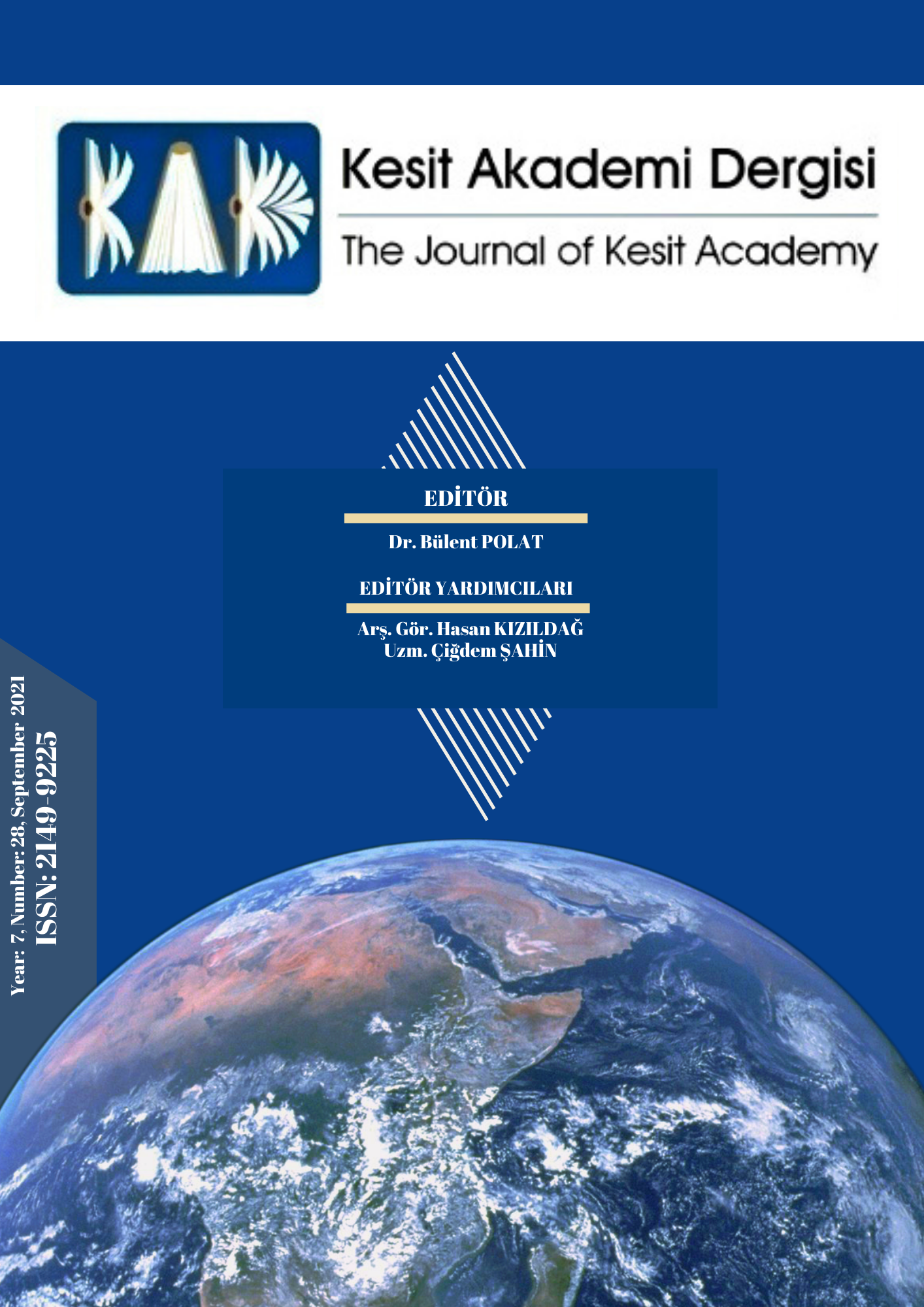COVİD-19 SALGIN SÜRECİNDE İLKOKULLARDA UYGULANAN UZAKTAN EĞİTİM SÜRECİNE İLİŞKİN ÖĞRETMEN GÖRÜŞLERİNİN İNCELENMESİ
Author :
Abstract
Bu çalışmada, Milli Eğitim Bakanlığı’na bağlı ilkokullarda görev yapan öğretmenlerin, Covid-19 salgın sürecinde Türkiye’de uygulanan EBA TV ve Eğitim Bilişim Ağı (EBA) aracılığı ile yapılan uzaktan eğitim sürecine ilişkin görüşlerinin belirlenmesi amaçlanmaktadır. Araştırma nitel araştırma yöntemlerinden durum çalışması olarak desenlenmiştir. Araştırmanın çalışma grubunu Sapanca ilçesinde Milli Eğitim Bakanlığına bağlı ilkokullarda görev yapan 25 sınıf öğretmeni oluşturmaktadır. Araştırma verilerinin toplanmasında alan uzmanlarından faydalanılarak araştırmacı tarafından geliştirilen yarı yapılandırılmış görüşme formları kullanılmıştır. Görüşme formunda açık uçlu sorulara yer verilmiştir. Elde edilen veriler betimsel analiz ve içerik analizi yöntemleri ile analiz edilmiştir. Araştırmadan elde edilen bulgular doğrultusunda; öğrencilerin uzaktan eğitime yeterli düzeyde katılım sağladığı, eğitime katılamayan öğrenciler ile Whatsapp üzerinden ödevlendirme ve telefonla bireysel görüşmeler yapıldığı, öğrencilerin uzaktan eğitime katılamama sebebi olarak internet ve bağlantı sorunu yaşadıkları, öğrencilerinin genelinin uzaktan eğitim esnasında istekli oldukları, uzaktan eğitim sürecinde öğrencilerin kitap okuma alışkanlıklarının yetersiz seviyede olduğu sonuçlarına ulaşılmış ve sınıf mevcutlarının azaltılması, ekonomik imkanı olmayan öğrencilere tablet ve bilgisayar desteği verilmesi konularında önerilerde bulunulmuştur.
Keywords
Abstract
In the study, the Ministry of Education due to primary school students who attend, Covidien-19 implemented in Turkey in the epidemic process EBU TV and Education Information Network (EBA) of distance education process conducted via the aims of evaluation taking the views of primary school teachers. Case study design, one of the qualitative research methods, was used in the study. The study group of the research consists of 25 classroom teachers working in the MEB primary schools in Sapanca. In the collection of research data, semi-structured interview forms developed by the researcher using field experts were used. Open-ended questions were included in the interview form. The obtained data were analyzed with descriptive analysis and content analysis methods. In line with the findings obtained from the research; students participate in distance education sufficiently, students who cannot participate in education are assigned homework via WhatsApp and individual calls are made by phone, students have internet and connection problems as a reason for not participating in distance education, students are generally willing during distance education, students' reading habits in the distance education process are at an insufficient level. and suggestions were made to reduce the class size and provide tablet and computer support to students who do not have economic means.
Keywords
- Allen, I. E. ve Seaman, J. (2016). Online report card: Tracking online education in the United States.
- Aslantürk, E. (2008). Sınıf öğretmenlerinin ve sınıf öğretmeni adaylarının okuma ilgi ve alış- kanlıklarının karşılaştırılması [Yayımlanmamış Yüksek Lisans Tezi]. Adnan Menderes Üniversitesi Sosyal Bilimler Enstitüsü.
- Aydın, A. F. (2020). Post-Truth dönemde sosyal medyada dezenformasyon: Covid-19 pandemi süreci. Asya Studies, 4 (12) , 76-90.
- Benson, R. ve Samarawickrema, G. (2009). Addressing the context of e-learning: Using transactional distance the oryto in form design. Distance Education, 30(1), 5-21.
- Bilen, M. (2009 ). Plandan uygulamaya öğretim. Anı Yayıncılık.
- Canpolat, U. ve Yıldırım, Y. (2021). Ortaokul öğretmenlerinin covid-19 salgın sürecinde uzaktan eğitim deneyimlerinin incelenmesi. Açık Öğretim Uygulamaları ve Araştırmaları Dergisi, 7 (1) , 74-109.
- Çakın, M. ve Akyavuz, E. (2020). Covid-19 süreci ve eğitime yansıması: öğretmen gö- rüşlerinin incelenmesi. International Journal of Social Sciences and Education Research, 6 (2), 165-186.
- Demir, F. ve Özdaş, F. (2020). Covid-19 sürecindeki uzaktan eğitime ilişkin öğretmen görüşlerinin incelenmesi. Milli Eğitim Dergisi, Salgın Sürecinde Türkiye’de ve Dünyada Eğitim, 273-292.
- Gülbahar, Y. ve Alper, A. (2009). A content analysis of the studies in instructional. Uni- versity Journal of Faculty of Educational Sciences (JFES), 42 (2), 93-112.
- İnci Kuzu, Ç. (2020). Covid-19 pandemi sürecinde uygulanan ilkokul uzaktan eğitim programı (EBA TV) ile ilgili veli görüşleri. Milli Eğitim Dergisi, Salgın Sürecinde Türkiye’de ve Dünyada Eğitim, 505-527.
- Karaşahin, M. (2009). İlköğretim ve ortaöğretim okullarında görev yapan öğretmenlerin oku- ma kültürlerinin değerlendirilmesi, MEB Eğitimi Araştırma ve Geliştirme Dairesi Başkanlığı, Ankara.
- Kaya, Z. (2002). Uzaktan eğitim. Ankara: Pegem Yayıncılık
- Konan, N. (2013). İlköğretim okulu yöneticilerinin okuma alışkanlıkları. Kuram ve Uy- gulamada Eğitim Yönetimi, 19(1), 31-59.
- Kuyubaşıoğlu, R. ve Kılıç, F. (2019). Ortaokul öğretmenlerinin görüşlerine göre Eba (eğitimde bilişim ağı) kullanım düzeylerinin incelenmesi. Journal of Advanced Education Studies, 1 (1) , 32-52.
- MEB, Milli Eğitim Bakanlığı. (2020a). Haber arşivi. http://www.meb.gov.tr/bakan- selcuk-23- martta - baslayacak - uzaktan – egitime – iliksin – detaylari –anlatti /haber/20554/tr.
- MEB, Milli Eğitim Bakanlığı. (2020b). Haber arşivi. http://www.meb.gov.tr/ebada- canlisinifla-egitim-basliyor /haber/ 20602/ tr.
- Moore, M. G. ve Kearsley, G. (2011). Distance education: A systems view of online learning. Cengage Learning.
- Oranburg, S. (2020). Corona virüs zamanında uzaktan eğitim: Profesörler için hızlı ve kolay stratejiler. Duquesne Üniversitesi Hukuk Fakültesi Araştırma Belgesi No. 202002.
- Sarışık, S., Tuğra, F. ve Sarışık, S. (2021). Ortaokul öğretmenlerinin uzaktan eğitimde eğitim bilişim ağı (EBA) canlı ders uygulaması kullanımına ilişkin öğretmen görüşleri. Uşak Üniversitesi Eğitim Araştırmaları Dergisi, 7 (1) , 1-18.
- Simonson, M., Zvacek, S. ve Smaldins, S. (2019). Teaching and learning at a distance.
- Sun, A. v e Chen, X. (2016). Online education and it seffective practice: Are search review. Journal of Information Technology Education, 15, 157-190.
- Üçışık, S. ve Tuna, F. (2004). Orta öğretim kurumlarında coğrafya anlatım becerisinin bilgisayar destekli anlatımla geliştirilmesi. Marmara Coğrafya Dergisi, 9, 97-118.
- Van Voorhis, F. L. (2004). Ev ödevi ritüeli üzerine düşünmek: Ödevler ve tasarım- lar. Teoriden Uygulamaya, 43:3, 205-212.
- Yıldırım, A. ve Şimşek, H. (2008). Sosyal bilimlerde nitel araştırma yöntemleri. Seçkin Ya- yıncılık.
- Yurtbakan, E. ve Akyıldız, S. (2020). Sınıf öğretmenleri, ilkokul öğrencileri ve ebeveyn- lerin covid-19 izolasyon döneminde uygulanan uzaktan eğitim faaliyetleri hakkındaki görüşleri. Turkish Studies, 15(6), 949-977.





